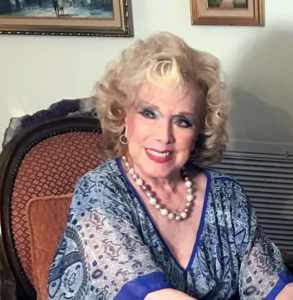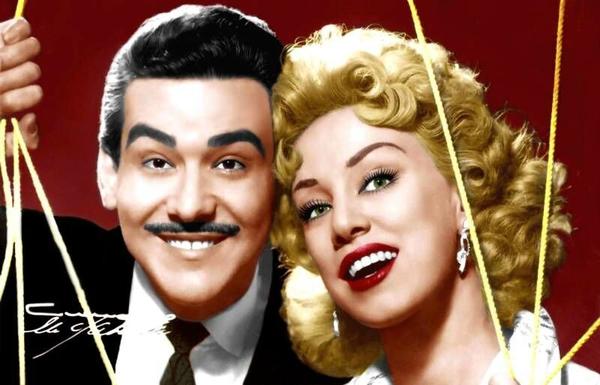 ROSITA FORNES, CANTANTE Y ACTRIZ CUBANA.
ROSITA FORNES, CANTANTE Y ACTRIZ CUBANA.
Rosita Fornés nació en Nueva York, EE.UU., el 11 de febrero de 1923. Fue llevada a Cuba por sus padres nacidos en Cataluña cuando tenía 2. Su verdadero nombre es Rosalía Palet Bonavia. Fornes se convirtió en su nombre artístico a la edad de quince años, a petición de su padrastro, quien ayudó a criar a su desde la edad de 2. Fornes primero ganó elogios de la crítica como cantante después de ganar el mejor premio en un concurso de talento cubano ampliamente conocido en 1938 (Arte-La Corte Suprema La Corte Suprema del de las Artes-).
Desde este momento se convirtió en más prolífico, admirada y denostada destacado de Cuba. Ella ha sido, a lo largo de su brillante carrera larga, el centro de las controversias políticas y personales. Su visita a los EE.UU. en mayo a septiembre del 1996, por ejemplo, genera en Miami los más grandes y políticamente calienta la cobertura de prensa que cualquier artista (extranjeros de nacionales) se había producido nunca en esta ciudad. Ella fue, en sus años más jóvenes, y así hasta los sesenta años, considerado como un símbolo sexual, como la diosa rubia indiscutible del mundo del espectáculo cubano, aunque sus verdaderas armas en este campo han sido su hechizante presencia escénica, su profesionalismo inquebrantable y una voz para cantar maravillosamente melodiosa (su repertorio etapa ha incluido numerosas operetas de cuerpo entero y arias de ópera).
En sus veinte años, ya famosos en Cuba, viajó a México donde se convirtió en una sensación de noche y duradera. A día de hoy, Rosita Fornés es recibido en México como La Primera Vedette de América (The First Show-Mujer de las Américas). En los años cuarenta y cincuenta, ella viajó extensamente por toda América Latina, los EE.UU. y Europa. En la última parte de la década de 1950 se convirtió en el más popular de la diva etapa de España, rivalizando estrellas españolas como Celia Gámez y el menor Sarita Montiel. En Cuba, sus entradas agotadas Teatro actuaciones e incontables apariciones en televisión han hecho que la Sra. Fornés superior superestrella femenina de este país. Rosita Fornes ha recibido numerosos premios artísticos en Cuba y en el extranjero. Ella se declara apolítico y católico devoto, y ha permanecido en Cuba a pesar de la Revolución de 1959.
Ella es una cálida, ingeniosa, cariñosa y una mujer muy refinada que, en el pico de la crisis del SIDA en Cuba (cuando el SIDA sufferes donde aisló a la fuerza en una institución de salud administrado por el Estado), que visitan a los enfermos y realizar para ellos libremente. En varias ocasiones, se ha considerado a su carrera cinematográfica como un “accidente”, y ha declarado sin lugar a dudas que ella lamenta su filmografía anterior, que considera demasiado viciado y comercial. Su primer marido fue el actor mexicano Manuel Medel, con quien tuvo a su único hijo, una hija con el nombre de Rosa María Medel, también actriz. Su segundo marido, un actor cubano muy guapo y popular con el nombre de Armando Bianchi, murió en 1981 en un accidente por ahogamiento después de veinte y ocho años de matrimonio. Nombre Rosita Fornes ‘se asocia en todo el mundo de habla hispana con otros grandes nombres en latín de la época: Jorge Negrete, Emilio Tuero, Libertad Lamarque, Antonio Aguilar, María Victoria, Dolores del Río, María Félix, Agustín Lara, Adolfo Guzmán, Mario Moreno (Cantinflas)-con quien, confesó en el año 1996, tuvo una larga carrera y el amor apasionado romance).
Ya no explotado como un símbolo sexual, Rosita Fornes permanece hoy (noviembre de 1997), un activo, al mando y la presencia que se venera en la escenografía cubana. Todavía queda la parte superior biling y ella aún canta al cierre de cada programa de variedades importante que tiene lugar en la Isla (nadie se le ocurriría dejar la hasta La Fornes canta). Siempre considerado como el non plus ultra de glamour en los círculos artísticos de Cuba, no es poco común (hasta la fecha) para observar a la gente “ohand ah!” a la vista de un vestido deslumbrante y amablemente a punto Rosita Fornes abriéndose paso entre la multitud en una fiesta o tomar el centro del escenario.
Ella acaba de terminar una serie de conciertos en La Habana (julio de 1997), protagonizó una obra de teatro de comedia (Nenúfares en el techo del Mundo), y fue parte del jurado internacional en el Festival Internacional de Cine de Bahía, Brasil (octubre 1997 ). Ella cuida de su anciana madre, Lupe (un encantador, encantadora dama cuyo carácter fuerte, explica este rasgo en el triunfo de Rosita frente a la adversidad). Cuando se le preguntó, invariablemente, si la edad le preocupa, su respuesta es siempre la misma: “La edad es un estado de ánimo”. Y ella lo ha probado.
 ROSITA FORNES, CUBAN SINGER AND ACTRESS.
ROSITA FORNES, CUBAN SINGER AND ACTRESS.
Rosita Fornés was born in New York, USA, on February 11, 1923. She was taken to Cuba by her Catalonian-born parents when she was 2. Her true name is Rosalia Palet Bonavia. Fornes became her artistic name at the age of fifteen at the request of her step-father, who helped raise her from the age of 2. Fornes first won critical acclaim as a singer after winning the best prize at a widely-known Cuban talent contest in 1938 (La Corte Suprema del Arte -The Supreme Court of the Arts-).
From this moment on she became Cuba’s most prolific, admired and maligned performer. She has been, throughout her brilliantly long career, the center of personal and political controversies. Her visit to the US in May to September of 1996, for instance, generated in Miami the largest and most politically heated press coverage that any performer (foreign or national) had produced ever in this city. She was, in her younger years and well into her sixties, regarded as a sex symbol, as the unchallenged blonde goddess of Cuban show business, although her true weapons in this field have been her spellbinding stage presence, her unbending professionalism and a beautifully melodious singing voice (her stage repertoire has included numerous full-length operettas and opera arias).
In her twenties, already famous in Cuba, she traveled to Mexico where she became an overnight and lasting sensation. To this day, Rosita Fornes is received in Mexico as La Primera Vedette de America (The First Show-Woman of the Americas). In the forties and fifties she toured extensively throughout Latin America, the US, and Europe. In the latter part of the 1950s, she became Spain’s most popular stage diva, rivaling Spanish stars such as Celia Gamez and the younger Sarita Montiel. In Cuba, her sold-out theater performances and countless TV appearances have made Ms. Fornes this country’s top female superstar. Rosita Fornes has received numerous artistic awards in Cuba and abroad. She declares herself apolitical and a devout Catholic and has remained in Cuba despite the Revolution of 1959.
She is a warm, witty, caring and very refined woman who, at the peak of the AIDS crisis in Cuba (when AIDS sufferers were forcibly isolated into a state-run health institution), would visit the sick and perform for them freely. On several occasions, she has regarded her film career as an “accident”, and has declared in no uncertain terms that she deplores her earlier filmography, which she considers too flawed and commercial. Her first husband was Mexican actor Manuel Medel with whom she had her only child, a daughter by the name of Rosa Maria Medel, also an actress. Her second husband, a very handsome and popular Cuban actor by the name of Armando Bianchi, died in 1981 in a drowning accident after twenty-eight years of marriage. Rosita Fornes’ name is associated throughout the Hispanic world with other great Latin names of the period: Jorge Negrete, Emilio Tuero, Libertad Lamarque, Antonio Aguilar, Maria Victoria, Dolores del Rio, Maria Felix, Agustin Lara, Adolfo Guzman, Mario Moreno (Cantinflas)-with whom, she confessed in 1996, she had a long-running and passionate love affair).
No longer exploited as a sex symbol, Rosita Fornes remains today (Nov. of 1997), an active, commanding and venerated presence in the Cuban stage scene. She still gets top billing and she still sings at the closing of every important variety show that takes place in the Island (no one would even think of leaving the until La Fornes sings). Always considered to be the non plus ultra of glamour in Cuba’s artistic circles, it is not uncommon (to this day) to watch people “ohand ah!” at the sight of a stunningly dress and graciously poised Rosita Fornes making her way through the crowds in a party or taking center stage.
She has recently finished a series of concerts in Havana (July 1997), starred in a comedy play (Nenufares en el techo del mundo), and was part of the international jury at the International Film Festival in Bahia, Brazil (Oct. 1997). She takes care of her elderly mother, Lupe (a delightful, lovely lady whose strong character explains this trait in Rosita’s triumph versus adversity). Asked, invariably, whether age worries her, her response is always the same: “Age is a state of mind”. And she has proven it.
Agencies/ PedroFBaez/ Comet/ Internet Photos/ YouTube/ Arnoldo Varona/ www.TheCubanHistory.com
THER CUBAN HISTORY, HOLLYWOOD.







